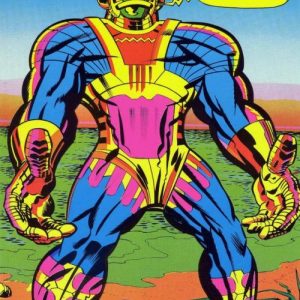Prior to my career at Portland State University, I enjoyed all the career benefits of a creative writing degree: cooking, serving, managing—anything with an apron. Then I moved to Portland with the intent to find a “real” job. Have you ever bought Tupperware from a fresh-faced go-getter in the grocery store? Did that person seem like a fleshy canvas of excited desperation stretched over a beaten down and creakily animated theme park robot? That was me, and I lasted two weeks before I quit and filled out my PSU application.
Of the courses offered, I gravitated toward the comics studies postbaccalaureate program. The Eisner-winning staff was welcoming and helpful as I regained my book legs over the 2015 academic year. Outside a few greatest hits, I departed from comics around 2002 and did not pick up a Marvel or DC comic until I started up again at PSU, leaving me woefully unprepared to contend with classmates that never put them down. Unprepared for the elite set of specialized comics knowledge my peers would exhibit, I met that wonderful stereotype of comic book condescension. Naturally, I considered myself immune; after all, I had an English degree, loved Dungeons & Dragons and many videogames, and welcomed new knowledge about any beloved “waste of time” media. These skills and attributes aside, many considered my analysis of Watchmen picayune or brushed aside my enjoyment of the first Civil War. My initial reaction was one of pained exclusion. Luckily, I am (somewhat) an adult and kept my feelings safe inside. I had found several literary titles since high school, making my return plunge less jarring than anticipated, but I wanted to understand how my peers could be so prickly and defensive of their comics knowledge. The more time I spent learning the history and process of the medium’s publication, the more I became aware of the roots for such superiority.
The more you learn about many mainstream comics, the more you come to understand how these stories and characters interweave, challenge one another, and suffer (or enjoy) endless reincarnation through generations of creators. The history of comics publishing is textured by ups and downs—betrayals and triumphs endured by generations of creators often chewed up and ejected by their beloved industry. Combine an oft-challenged publishing history with the cultural (mis)conception of comics as a medium for children or the intellectually deviant, and this defensiveness becomes a clear reaction from individuals unwilling to tolerate a dying cultural norm.
There is an academic out for the tenacious: the majority of comics lovers are all about sharing. When you have no idea what is good and strike out blindly to receive welts from the barbs of the knowledgeable, inquisition will get you everywhere. My solution became endless questioning. When meeting the snark of a comrade, I would simply ask, “What do you like? What are you reading?” When amiability is out of reach, the beautiful culture of sharing and exploration surrounding comics is infectious; although someone may not like you, they may lend you something incredible (or at least make a recommendation).
Of course, such social tai chi is mostly unnecessary, and your average student of comics will welcome you right along into their world and help you craft your own. In the Ooligan program such supportive and aggressively collective sharing is in the older, more academically “respected” vein. Though we have yet to publish a graphic narrative, the excited community around the printed word exists to show no stopping in the modern crystallization of trade publishing.
This is the power of storytelling, and comics are unique in their articulation and audience. Comics have always been and continue to be a massively important medium for storytelling and meaning creation, constantly traversing the boundary of trade publication into the educational, intersectional, and literary markets. Understanding and articulating this distinction has become a joy of mine (even lacking a mental encyclopedia of every Green Lantern), as the true focus of comics creation and advocacy stands outside superiority and judgment to embrace and create the new under the equally unique watch of comics lovers.

